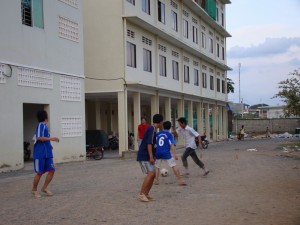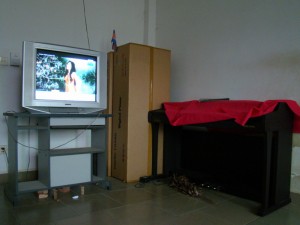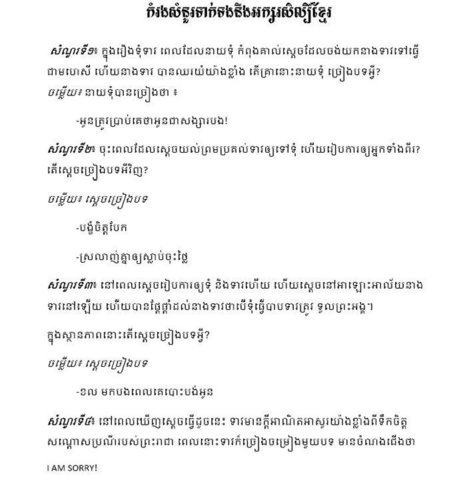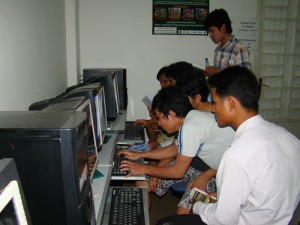by: Dara Saoyuth 19/09/2010Just received from my friend…
Cheers,
Author - Dara Saoyuth
Spending almost a whole day in front of my computer screen made me headache, so this evening, I hurried to go out after I was invited by my friends to join a photo exhibition under the theme LIFE ALONG THE RAILS.
As soon as I arrived the place, I saw photos by a 31-year-old Conor Wall from Ireland was printed in large size and stuck to the walls of the room, and many people mostly are foreigners gathered around to see the photos.

Visitors gathering around to see the photos and some are communicating with people who have the same interest / By: Dara Saoyuth
In the exhibition, there were around 20 photos to be displayed and all of them showed the daily lives of people living along the tracks.
“I first became interested in the lives of people living along the railway tracks two years ago when I used to walk along the rails in Boeung Kok. I took photos of locals there, going back again and again to shoot more and return prints to those in the pictures. I never really had a plan to publish or exhibit those shots. I was just doing it because I enjoyed it,” said Cornor Wall, who first came to Cambodia in 2004.
Who know the purpose of showing these photos?
Actually, I don’t have answer to the question, but I think that he wants us, especially human right activists to pay more attention on people over there since the government is working on the reconstruction of the railway tracks. More people might face eviction from their home, so on the railway, we won’t be able to see vendors selling or children playing on it anymore…
To know more about Conor Wall and his Photography and Story Portfolio, check his website by CLICKING HERE
by: Dara Saoyuth 16/09/2010

Cambodian Students who stay in dorm are playing football in front of their building in the evening / Photo by: Koam Tivea
You might want that noise to stop while you are studying or that light turned off when you are trying to sleep, but these are just the hassles you have to endure in a dormitory. Although living with a roommate in a dorm – and dealing with the unavoidable annoyances this entails – is a nearly universal experience for university students in many foreign countries, there is also a small group of Cambodian college kids living in close quarters at the Kingdom’s only state-run dormitory for university students.
After a few visits to the dorm, I decided that in order to get a true sense of dorm life, I needed to spend a night there myself. So last week I packed my bag and headed to the six-building dormitory campus on Russian Boulevard – neighbouring the Royal University of Phnom Penh – to get a taste of the parentless life.
In foreign countries, room and board (food and living accommodations), are usually part of tuition fees, but in Cambodia, dorms are free to some students from poor families and remote provinces and are reserved mostly for females (although my experience was mostly with young men for obvious reasons).

Cambodian Students who stay in dorm are playing football in front of their building in the evening / Photo by: Koam Tivea
Because of the noticeable lack of adults on the premises, you might expect security to be in short supply. But I felt at ease and well taken care of from the get go, and I witnessed a way of life that you’re not likely to see anywhere else.
The first lessons you are forced to learn are those of acceptance and cooperation. Many of us are used to having our own room and our own space to retreat to when we need some time alone, but you can say goodbye to these comforts as soon as you set down your bags.
San Kimleang, a 23-year-old woman from Kampong Thom province, said she used to be spoiled by her family, but has shed her sense of entitlement over the past three years. “We have to stay with our roommates for four years, so we need to find ways of living peacefully and it is critical to be tolerant of each other,” she said.
It’s easy to snap at siblings and take out your frustrations on family members, she explained, but while living with people outside her family, she often has to bite her tongue when she is angry or fed up with the behaviour of her dorm-mates.
Bou Sophal, who just moved into the dorm last year, knows all too well the challenges of communal living. “Sometimes people cause a disturbance, for example there will be a noise during when we want to study silently or our roommate needs light for studying while we are trying to fall asleep,” he said. “We have to be patient, tolerate and forgive. Today they unintentionally disturb us, but in the future we might do the same.”
While I could certainly understand their difficulties, having enjoyed my own quiet room for the past 20 years, I also saw how much the students cared for each other.
Hou Vanthy, 19, said he feels lucky to live in the dorm because his parents, who are farmers with six other children, have little money to spare. As he has become acclimated to Phnom Penh over the past year, he has been able to ask for help from the young men he lives with. “If I don’t have the documents I need, I can ask from them, and I talk with them about their experiences so that I can prepare myself for problems that lie ahead,” he said. “I have never lacked advisers while I’ve been living here.”
I was a bit jealous when I saw a computer room in the building. I have a laptop but, unlike the guys at the dorm, I do not have access to free computer lessons on a regular basis.
More senior members of the dorm, such as Suon Sampheavin, a 22-year-old student in his fifth year of civil engineering studies, said that design programmes like AutoCAD are crucial for engineers, but most students living at the dorm can’t afford the relatively expensive fees of a typical computer class. “I teach AutoCAD on weekends, using what I know, so the other guys don’t have to spend money on classes outside. If I don’t help them, they will face difficulties in the future,” he said.
I was happy to see that it wasn’t all work in the dorm. Barring rain, the self-sustaining students set aside some time in the evening to play football and badminton in the space outside of their dorm. Once they have worked up an appetite, they prepare dinner and, in the men’s dorm at least, pile in front of the TV to enjoy their food with the on-screen entertainment.
There is not a complete lack of adults – there is a health officer on site in case of an illness or emergency, and there is also not a complete lack of authority. Four buildings have adult managers, while two dorms have elected student managers to make sure things don’t get out of hand.
Ban Sam, who has been staying in the dorm since 2007, said that as the men’s manager he makes sure that students who enter the dorm follow the rules.
“Hanging around outside late is not allowed,” the 21-year-old said. “Gambling, drinking beer, or using drugs in the building is banned. For the safety of all students, bringing people from outside the dorm without asking for permission is not allowed,” he added, starting to sound like my parents.

This is a room in which Cambodia’s dorm-dwellers usually bring their meal to eat and enjoy watching TV together / Photo by: Koam Tivea
But just as I was thinking that dorm life signalled a release from chores, it only got worse. “Students have to live with cleanliness and hygiene; for example they have to clean their rooms and take turns cleaning the bathroom and toilet as it is used by everyone.” Ugh! The dorm really was starting to feel like home.
While the stories you hear about foreign dorms might sound more like anarchy than university, it seems that Cambodia’s dorm-dwellers are quite tame. While most of us have a family waiting for us when we finish our classes for the day, these students only have each other, and the way they support each other was nothing short of incredible. I was thankful for the openness and hospitality of my hosts, but happy to head home when I woke up in the morning.
by: Dara Saoyuth This article was published on Lift, Issue 36, September 15, 2010

This is my place during my intern at AFP, and papers on the desk are what I have to read every morning / by: Dara Saoyuth
Today is the last day for me at Agence France-Presse (AFP), so I have to say goodbye to everybody there though I don’t want to leave them. Spending two months intern at a news agency, I have learned a lot more than what I expected.
What have you learned from your intern?
To answer the above question precisely, I need a lot of pages to write down my idea, and everybody might leave this article after seeing its long content. What I wrote below is not the report for my university. It’s just a note to wrap up my intern period (12/07/2010 – 10/09/2010). Cheers,
First of all, I cannot forget my first day when I met only Patrick Falby, a former AFP bureau Chief in Cambodia, while everybody was on holiday. He showed me my place for the next two months and asked me to read Khmer newspapers of that day and I had to tell him what I found interesting. I finished it just a few minutes before I left for lunch, so he asked me whether I can find 5 story ideas when we met after lunchtime. I was very happy when 3 of my stories were accepted, and he told me to select one among the three stories which I can finish writing within a week. I started my story and then I found out that it’s not an easy task to cover each feature, and that’s the reason why I did only one feature during my two-month intern. Beside from working on my own story, I had to go with Patrick to help him getting quotes from Cambodian people since he does not know Khmer much.
A short time later, Patrick left Cambodia, so I have to be under the supervision of Mr. Suy Se (I normally call him Bong Se), a Cambodian AFP correspondent. He seems to be a strict person, but I can see the kindness inside his heart, especially when he left the office late because of helping me editing my feature story. Though sometimes he did, but I feel that Bong Se doesn’t want to give direct tutorial to me, for example he just assigned me to write a story and after he edited it, he printed the edited version for me to compare with my version. I have to accept that there are a lot of things I have learnt from him counting from how to interview different sources to how to write a story. He also spent a lot of him times telling me what’s different between working for wire service and working for local newspaper because he also used to be a writer for one local paper.
Another person that I also cannot forget is Mr. Tang ChhinSothy (I normally called him Bong Thy), a photographer for AFP in Cambodia. I have to admire his skills in shooting photo because all photos from him look great to me. When I have free time, mostly I take my camera and run after him when he went to shoot any photo. He taught me some techniques on how to take a photo with better quality and focus. You see, I have learned a lot not only writing but also photo shooting. That’s why I said I have learned more than I expected.
PHNOM PENH, Thursday 19 August 2010 (AFP) – Standing in front of a school in Cambodia’s capital Phnom Penh, Than Vichea read out answers over his mobile telephone to his sister who was taking national exams inside.
He was not alone. Even the police deployed outside schools to stop relatives providing answers to the more than 100,000 students who sat the tests last month could not prevent cheating in many of the exam centres.
“What would happen if they fail?” asked Than Vichea. “We have to think about our expenses for schooling, part-time studies and fuel costs, and especially our time.”
Several students interviewed by AFP said they had bribed teachers to allow them to check notes they had smuggled into the exams, or answer sheets allegedly sold in advance by teachers outside the schools.
One said he had paid about 30 dollars to teachers during two and a half days of exams so they would turn a blind eye to cheating and keep watch for school inspectors.
Others said they had bribed teachers to allow them to use their mobiles to phone relatives for help during the exams, the results of which will be announced on August 20.
“Besides copying answers from each other, candidates in my room could even make a phone call outside during the exams to get answers,” said a female student who asked to remain anonymous.
“And when there was only one correct answer sheet, it was hard to pass from one to another. So those who use modern phones took a photo of that sheet and then sent it to each other via the Internet on their phones,” she said.
After decades of civil war and the mass killing of educated people and intellectuals by the communist Khmer Rouge regime in the late 1970s, Cambodia is trying to restore its educational system. But it is a slow process.
“Our country was severely destroyed during the Khmer Rouge, so, as a child, we have started rebuilding,” said Mak Vann, a senior official with the Ministry of Education.
“We have trained more teachers and up to now it’s still not enough. We still lack educational tools, and more teachers need to be trained as well.”
Cambodia’s schools were obliterated under Khmer Rouge rule. The regime killed nearly two million people — including many teachers — as it emptied cities in its bid to forge a Communist utopia.
School buildings, documents and other educational resources were destroyed.
More than three decades later, a lack of infrastructure, human resources and educational tools, as well as low wages for teachers, are hindering efforts to improve standards in schools.
Not all students interviewed said there had been cheating in their exam rooms.
“In my room, it was very strict. We could not even look at each other during the exams. No cellphones were allowed,” said one, Bun Keo Voleak.
But the apparent acceptance of bribes by many teachers reflects rampant corruption in general in Cambodia that is seen by many as a growing barrier to quality in human resources for the Southeast Asian nation.
Cheating and paying bribes are common during exams, but Rong Chhun, head of the Cambodian Independent Teachers Association, said the problem appeared to have worsened this year.
“Weakness in the educational system cannot help our country to develop,” he said.
Cambodia was ranked 158th out of 180 countries in anti-graft organisation Transparency International’s index of perceived public sector corruption in 2009.
It was also ranked the second most corrupt Southeast Asian nation after Indonesia in an annual poll by the Political and Economic Risk Consultancy.
“Corruption exists and sometimes it seems to be open, such as teachers collecting money from students even in public class,” said In Samrithy, executive director of NGO Education Partnership.
He said Cambodia was lagging behind neighbouring countries in terms of the quality of education.
“Allowing students to cheat is dangerous for their future because what they write for their teachers is not their real knowledge, so when they face a real situation, especially in a competitive job market, they will have problems.”
by: Dara Saoyuth Edited by: Mr. Suy Se, Cambodian news correspondent for AFP, and AFP editorsThis article is under AFP copyright
What is the best way to guarantee that you get good grades? If you are reading this magazine, you know the answer is hard work, but for too many of the country’s student the answer is cheating.
Although a culture of cheating is more pervasive in high school than it is at the country’s universities, many students bring their habit of cheating with them when they make the transition to college.
Cheating at university not only makes students’ higher education worthless, it reflects poorly on professors and administrators who can’t control their classes, and it is frustrating for students who are studying hard for tests and exams.
Rather than accept cheating as an unavoidable occurrence, many universities in the Kingdom are working to eliminate cheating from their classes altogether.
Ban Thero, the vice-chancellor at Cambodian Mekong University, said cheating happened regardless of how hard teachers tried to stop it, but that it can be cut down.
“Everywhere is the same. It’s not only Cambodian students who try to cheat. If there is chance to cheat, they will cheat,” said Ban Thero.
“At examinations at CMU, we don’t allow students to use telephones or other tools that can store information during the exam, and we don’t allow students to borrow pens or pencils from each other.”
The Institute of Foreign Languages (IFL) has long been known among students as one of the most strict universities when it comes to examinations, which helps explain why their graduates speak their chosen language with such fluency.
Khan Bophan, the bachelor’s programmes coordinator at IFL, said Cambodian students graduating from high school had a habit of cheating during exams, so IFL made sure that these habits are broken before they enter the university by making the students pass a closely supervised entrance exam before the school year begins.
After that, if you can’t speak, read and write the language, you can’t pass the classes and students soon realise that cheating is no help.
“Students are under close supervision from two examiners. No paper is allowed on the desk. There is a wide space between each student. They are not allowed to pick up a call. They are not allowed out of the room. These are the main rules to ensure that there is no cheating at IFL,” said Khan Bophan. “We also shuffle teachers around, which means that people who teach a particular class do not check that class.”
According to a formal letter sent to all students at IFL, there are strict penalties for students caught cheating. The first time cheating results in a 20 percent deduction, second is 50 percent and the third time gets a 100 percent deduction.
When asked whether the strict rules, which may result in lower GPAs, will make it harder for student to get a job upon graduation, Khan Bophan said this should not be a concern, since transcripts alone do not get you a job. You have to pass multiple interviews, as well, and that is where students who have had to work for their grades will prevail.
by: Dara Saoyuth
This article was published on Lift, Issue 35, September 08, 2010
A 50-year-old British man has been arrested for a second time in Cambodia on suspicion of sexually abusing underage girls, one as young as 11, police said on Monday.
Michael Julian Leach, from London, was arrested at a guesthouse near Phnom Penh on Sunday, said Keo Thea, chief of the capital’s anti-human-trafficking and juvenile protection unit.
“Police had followed him from Phnom Penh because we knew in advance that he would go to find children in Kandal province,” he told AFP.
Leach, in Cambodia as a tourist, was being held for allegedly soliciting sex from two girls aged 11 and 13, Keo Thea said, adding that three Cambodian people were also arrested for procuring the girls.
Leach was first arrested in Cambodia 2005 – when he was working as a doctor at a children’s organisation – for allegedly having sex with three underage girls, police said.
He was freed after the court dropped charges against him, citing a lack of evidence.
Dozens of foreigners have been jailed for child sex crimes or deported to face trial in their home countries since Cambodia launched an anti-paedophilia push in 2003 in a bid to shake off its reputation as a haven for sex predators.
by: Dara Saoyuth Edited by: Mr. Suy Se, Cambodian news correspondent for AFP, and AFP editors This article is under AFP copyright06/09/2010
Yesterday morning, I got up early after I had recieved a phone call from my friend who informed me that there would be a protest outside the Vattanac Capital tower on Monivong Boulevard that morning. “Oh, Shit! Why this news start up my day? Nothing better than this?,” I asked myself while my hands were pushing two notebooks, one card book, my camera, recorder, and some more accessories into my backpack.
At around 7:20am, I arrived at the spot and saw hundreds of workers walking outside the workplace gate as they were striking for better pay and work conditions. I asked a worker who walked pass me, and he told me that he joint this protest because he could not stand anymore with a daily wage of $3.50 wage and $0.75 extra if they work overtime.
I haven’t count the number of protesters, but the report from some famous local newspapers said there were more than 700 protesters joint this two-day strike.
The latest news I got this morning said both sides (the company side and the worker side) agreed to the 12 points, which are priorities for our construction workers, among 24 demands submitted by workers after two hours of negotiations yesterday.
The 38-story Vattanac Capital tower was started construting in 2009 and set to be completed in 2012. It will house the head office of Vattanac Bank, a business centre and Vattanac Capital.
I have seen lots of protest, but this is the second time that I saw construction workers dare to express thier worries, angers, and demands through the strikes.
How many more strikes will be happened in the Kingdom in the future? And what kind of solutions will be used to solve the problems?
@Saoyuth
Below are some photos I shot during the second day protest and I decided to post it for my dear visitors to see clearly the situation at that time.
[slideshow]
Related stories: 1. High-rise employees strike over new shifts
2. Confrontation between Boeung Kak Lake and Security Forces
by: Dara Saoyuth 03/09/2010[slideshow]This is the second time of our traveling, which is usually started after lunch time and often finished around 2pm. Members in the group are the same (Tivea, Makara, Pheaktra, and Me), and our goal is not different. We all want to meet each other and find some new places or interesting scenes together because during our intern period, it’s hard for us to meet since we all work in different organizations.
Today, we drive along river side and cross Chroy Changva Bridge to shoot some photos at the other side of the bridge called Trey Makhang. Some photos from the trip are posted below for all my visitors. Cheers,
Related Story: Motor Cycling in the City (Part I)
by: Dara Saoyuth 02/09/2010Tonight, I am very lucky to have watched “Burma VJ” from the start till the end of the screening time at Meta House. This is a documentary film which you should not miss if you are interested in journalistic work.
The film shows a group of young video journalists who try to bring news about the protesting in Burma in 2007 to the outside world. For them, capturing news out to the world is more important than their own safety because sometimes they have been arrested by the police officers that they don’t want journalist to broadcast news about the protesting. Some parts of the film was shot on hand-held cameras and the footage was smuggled out of the country mainly by internet and was later broadcast back to Burma and the world via satellite.
[youtube=http://www.youtube.com/watch?v=V08EBWQLzyU&fs=1&hl=en_US&color1=0xe1600f&color2=0xfebd01&border=1]


